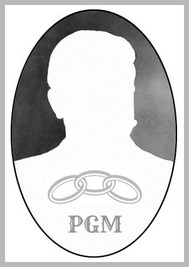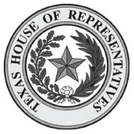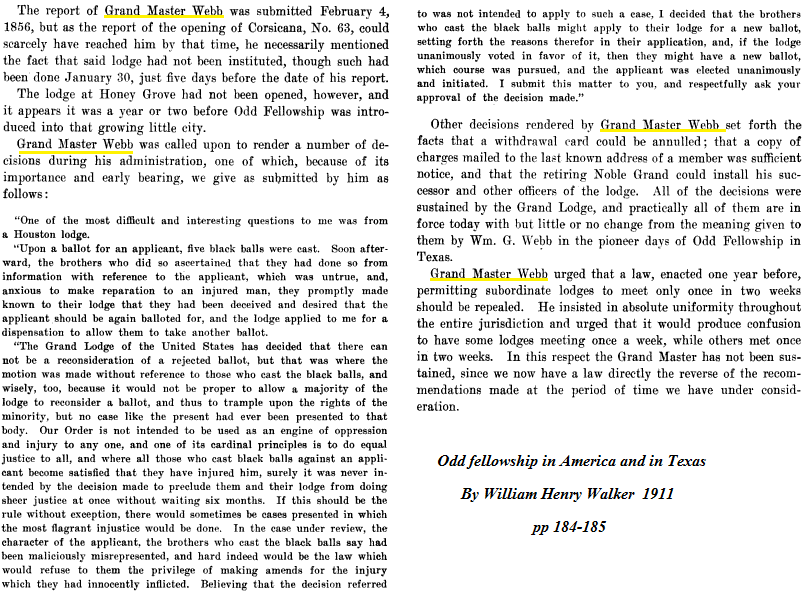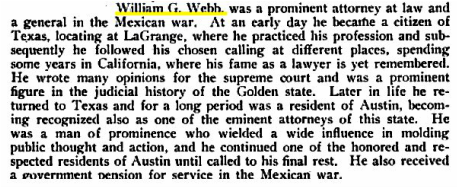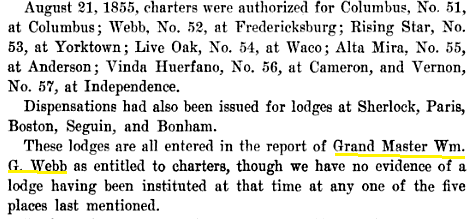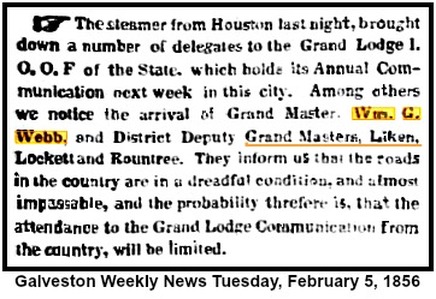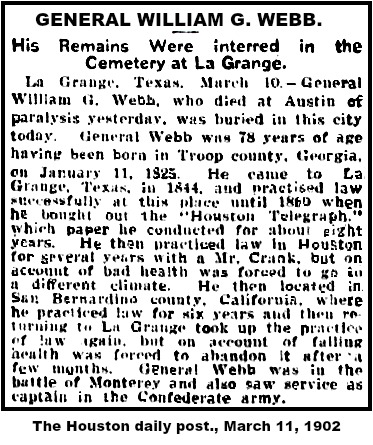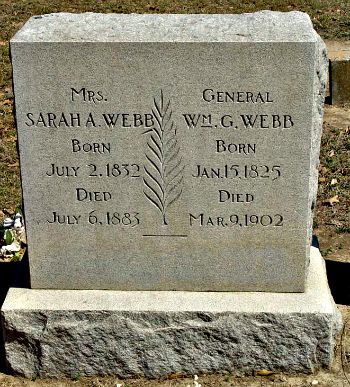William g. webb
PGM William G. Webb
I.O.O.F. Grand Master of Texas in 1855
Brigadier General
Texas Legislator
From: La Grange, Texas
I.O.O.F. Grand Master of Texas in 1855
Brigadier General
Texas Legislator
From: La Grange, Texas
If you have a picture or know of a picture of this I.O.O.F. Past Grand Master please CONTACT US
William G. Webb joined and enrolled, as a Private soldier, 14 May 1846 at La Grange, Fayette County, Texas. He mustered in 14 June 1846 at Point Isabel, Texas to Captain Green's Company, Colonel John Coffee Hay's (1st) Regiment Texas Mounted Rifles, his age not shown on roll. Muster rolls for 6 June thru 31 August 1846 record him as present. He fought with his unit against the Mexicans at the Battle of Monterey, Mexico 21-23 September 1846. He mustered out 2 October 1846 at Monterey, Mexico by reason of expiration of term of service. He was due pay and clothing since commencement of service.
Also served in Company C, 1st Texas Cavalry.
He was commissioned by the Governor of Texas, James P. Henderson as Lieutenant Colonel on 30 December 1846, and assigned to 3rd Regiment Texas Militia. Afterwards he served as a member of the Texas Legislature in 1847 and 1848, while practicing law in LaGrange, Fayette County. On 14 May 1848 he married Sarah Ann Amelia Hill, the 16 year old daughter of Asa Hill and in 1849 they had a daughter named Eugenna. They later had three sons
He served in the Texas State and Confederate military during the Civil War.
William Graham Webb, lawyer, soldier, and newspaperman, son of John Clabourn and Faithy Watkins (Alford) Webb, was born in Covington, Newton County, Georgia, on November 11, 1824. He received his education in Athens and Cassville, Georgia, and was admitted to the bar in Macon in 1844; in the same year he moved to La Grange, Fayette County, Texas. In the Mexican War he enlisted as a private in Capt. Thomas Green's Company, Col. John Coffee (Jack) Hays's First Regiment, Texas Mounted Rifles, and fought in the battle of Monterey in Gen. William Jenkins Worth's command. On December 30, 1846, Gov. James Pinckney Henderson commissioned Webb lieutenant colonel of the Third Regiment, Second Brigade, Fourth Division of the Texas Militia. He received his license to practice in district and inferior courts of Texas on April 12, 1847, in the Supreme Court on December 12, 1849, and in the United States District Court on November 25, 1853. During the years between the Mexican War and the Civil War, Webb practiced law in La Grange. In 1847-48 he was a member of the Texas House of Representatives. On May 14, 1848, he married Sarah Ann Amelia Hill, daughter of Asa Hill; they had one daughter and three sons. On April 14, 1860, Governor Sam Houston commissioned him brigadier general to organize the Twenty-second Brigade of the Militia of the State of Texas, comprising the counties of Matagorda, Wharton, Colorado and Fayette. He received his Confederate States of America law license on April 13, 1861. On June 12, 1861, he issued general orders organizing the Twenty-second Brigade, Texas State Troops, and on June 17, 1862, Gov. Francis Richard Lubbock renewed his commission. Thomas Jefferson Devine, Confederate States judge, on April 29, 1862, commissioned Webb, under the Act for the Sequestration of the Estates of Alien Enemies, Confederate States Receiver for Colorado, Comal, Fayette, Gonzales, Guadalupe, and Hays counties. It appears that his report early in 1863 to Gen. John Bankhead Magruder caused the latter to place Austin, Colorado, and Fayette counties under martial law. It is possible that Webb's Twenty-second Brigade was transferred to the command of a Confederate States general, for in December 1863, with the rank of captain in the Confederate States Army, he recruited his own unattached company of cavalry of men exempt from conscription.
By the end of the war Webb was again Confederate States Receiver. His territory apparently had been greatly enlarged from the original six counties, for on May 9, 1865, General Magruder granted him a pass to go unmolested throughout Texas, New Mexico, and Arizona. After the war Webb resumed the practice of law in La Grange. He was appointed administrator of the then-nonexistent University of Texas by Governor James Webb Throckmorton on January 5, 1867. Also in 1867 Webb purchased the Daily Telegraph (originally the Telegraph and Texas Register) and moved to Houston to take over as publisher and editor. He was ruined financially and ceased publication in 1873 but refused to take bankruptcy. He practiced law in Houston until February 1885, when he moved to Albany, Texas, to join his son, Sam, in the formation of a law, loan, land, and livestock firm. From Albany, he went to California, where on October 13, 1886, he was admitted to the bar by the Supreme Court of California. After six years as a lawyer in San Bernardino, he retired and returned to Texas in 1893. He died in Austin on March 9, 1902, and was buried in La Grange.
BIBLIOGRAPHY: James Farber, Texas, C.S.A. (San Antonio: Jackson, 1947). La Grange Journal, March 13, 1902.
Also served in Company C, 1st Texas Cavalry.
He was commissioned by the Governor of Texas, James P. Henderson as Lieutenant Colonel on 30 December 1846, and assigned to 3rd Regiment Texas Militia. Afterwards he served as a member of the Texas Legislature in 1847 and 1848, while practicing law in LaGrange, Fayette County. On 14 May 1848 he married Sarah Ann Amelia Hill, the 16 year old daughter of Asa Hill and in 1849 they had a daughter named Eugenna. They later had three sons
He served in the Texas State and Confederate military during the Civil War.
William Graham Webb, lawyer, soldier, and newspaperman, son of John Clabourn and Faithy Watkins (Alford) Webb, was born in Covington, Newton County, Georgia, on November 11, 1824. He received his education in Athens and Cassville, Georgia, and was admitted to the bar in Macon in 1844; in the same year he moved to La Grange, Fayette County, Texas. In the Mexican War he enlisted as a private in Capt. Thomas Green's Company, Col. John Coffee (Jack) Hays's First Regiment, Texas Mounted Rifles, and fought in the battle of Monterey in Gen. William Jenkins Worth's command. On December 30, 1846, Gov. James Pinckney Henderson commissioned Webb lieutenant colonel of the Third Regiment, Second Brigade, Fourth Division of the Texas Militia. He received his license to practice in district and inferior courts of Texas on April 12, 1847, in the Supreme Court on December 12, 1849, and in the United States District Court on November 25, 1853. During the years between the Mexican War and the Civil War, Webb practiced law in La Grange. In 1847-48 he was a member of the Texas House of Representatives. On May 14, 1848, he married Sarah Ann Amelia Hill, daughter of Asa Hill; they had one daughter and three sons. On April 14, 1860, Governor Sam Houston commissioned him brigadier general to organize the Twenty-second Brigade of the Militia of the State of Texas, comprising the counties of Matagorda, Wharton, Colorado and Fayette. He received his Confederate States of America law license on April 13, 1861. On June 12, 1861, he issued general orders organizing the Twenty-second Brigade, Texas State Troops, and on June 17, 1862, Gov. Francis Richard Lubbock renewed his commission. Thomas Jefferson Devine, Confederate States judge, on April 29, 1862, commissioned Webb, under the Act for the Sequestration of the Estates of Alien Enemies, Confederate States Receiver for Colorado, Comal, Fayette, Gonzales, Guadalupe, and Hays counties. It appears that his report early in 1863 to Gen. John Bankhead Magruder caused the latter to place Austin, Colorado, and Fayette counties under martial law. It is possible that Webb's Twenty-second Brigade was transferred to the command of a Confederate States general, for in December 1863, with the rank of captain in the Confederate States Army, he recruited his own unattached company of cavalry of men exempt from conscription.
By the end of the war Webb was again Confederate States Receiver. His territory apparently had been greatly enlarged from the original six counties, for on May 9, 1865, General Magruder granted him a pass to go unmolested throughout Texas, New Mexico, and Arizona. After the war Webb resumed the practice of law in La Grange. He was appointed administrator of the then-nonexistent University of Texas by Governor James Webb Throckmorton on January 5, 1867. Also in 1867 Webb purchased the Daily Telegraph (originally the Telegraph and Texas Register) and moved to Houston to take over as publisher and editor. He was ruined financially and ceased publication in 1873 but refused to take bankruptcy. He practiced law in Houston until February 1885, when he moved to Albany, Texas, to join his son, Sam, in the formation of a law, loan, land, and livestock firm. From Albany, he went to California, where on October 13, 1886, he was admitted to the bar by the Supreme Court of California. After six years as a lawyer in San Bernardino, he retired and returned to Texas in 1893. He died in Austin on March 9, 1902, and was buried in La Grange.
BIBLIOGRAPHY: James Farber, Texas, C.S.A. (San Antonio: Jackson, 1947). La Grange Journal, March 13, 1902.

